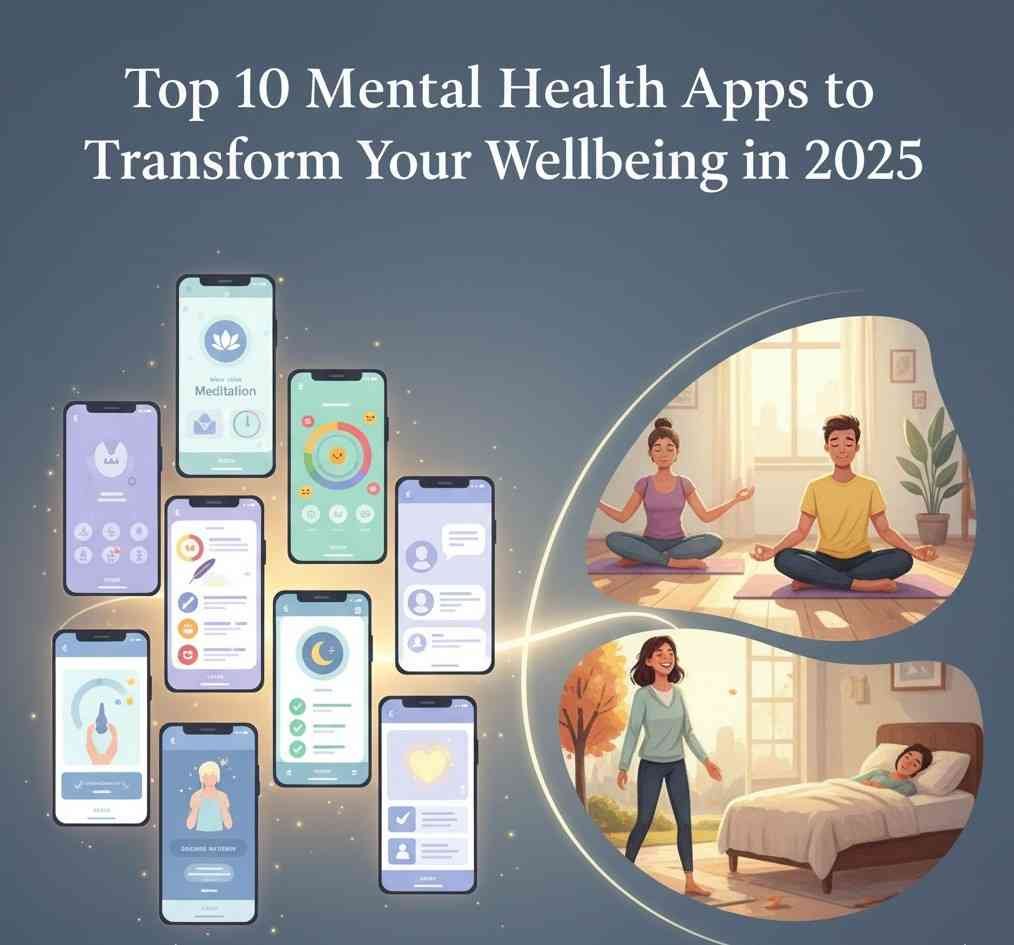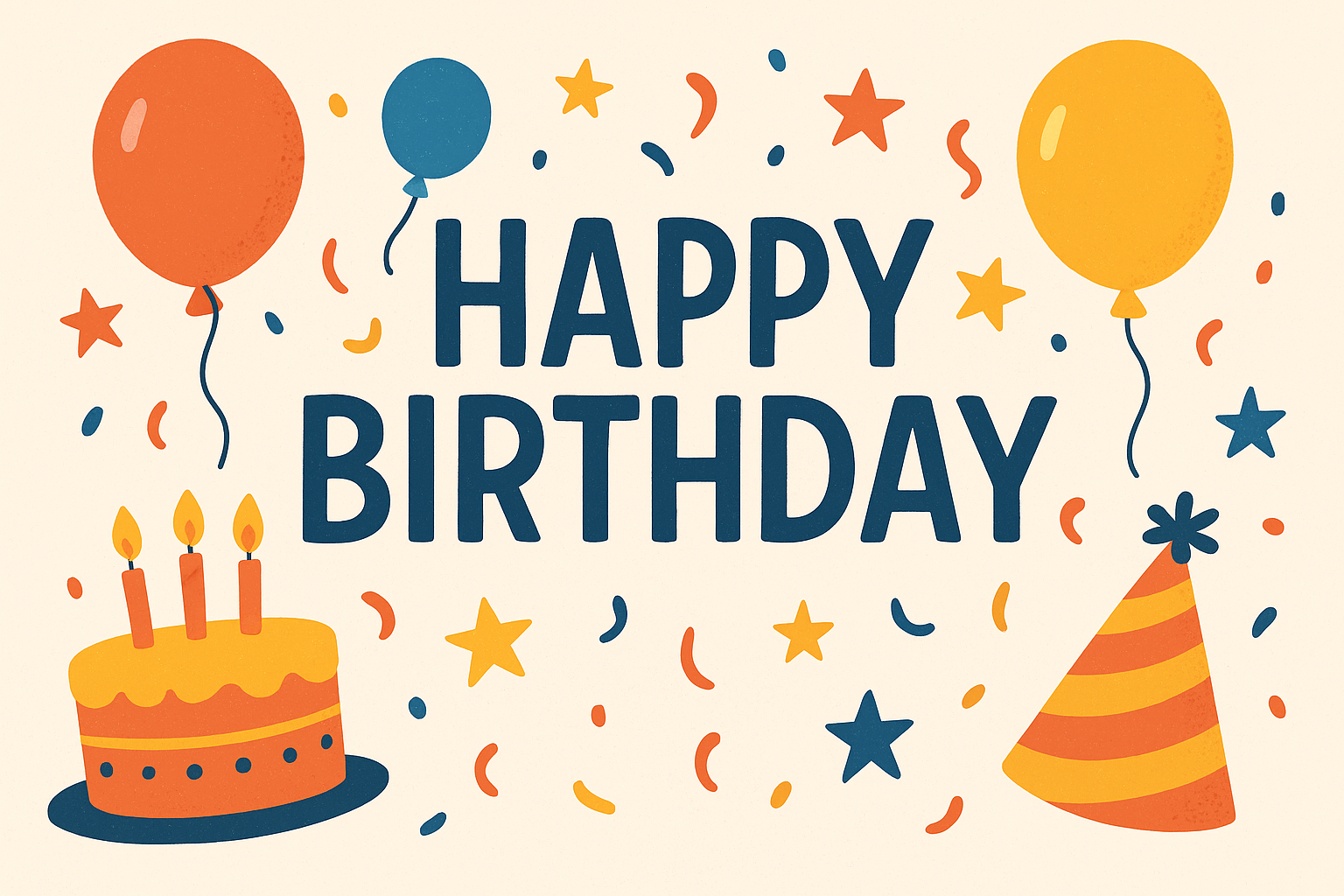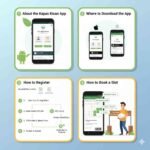
Top 10 Mental Health Apps to Transform Your Wellbeing in 2025
Mental health support has never been more accessible. With over 20,000 mental health apps available across app stores, finding the right digital therapy companion can feel overwhelming. Whether you’re managing anxiety, depression, or simply want to build better emotional habits, the right app can provide professional-grade support right in your pocket.
This comprehensive guide examines the most effective mental health apps available in 2025, analyzing their unique features, pricing structures, and therapeutic approaches. We’ve evaluated each platform based on clinical effectiveness, user experience, and real-world results to help you make an informed decision about your digital mental health journey.
The mental health app market has evolved significantly, with many platforms now offering evidence-based treatments that rival traditional therapy sessions. From cognitive behavioral therapy (CBT) modules to mindfulness training and crisis intervention tools, these apps represent a new frontier in accessible mental healthcare.
What Makes a Mental Health App Effective?
Before diving into our top picks, understanding the key components of effective therapy apps helps you identify which features matter most for your specific needs.
Evidence-Based Treatment Approaches
The most impactful mental health apps incorporate proven therapeutic methodologies like CBT, dialectical behavior therapy (DBT), and acceptance and commitment therapy (ACT). These aren’t just wellness apps—they’re digital implementations of clinical treatments that have helped millions of people worldwide.
Professional Oversight and Credentials
Quality mental health apps employ licensed therapists, psychologists, or psychiatrists to develop content and oversee treatment protocols. This professional involvement ensures the app provides legitimate therapeutic value rather than generic self-help advice.
Personalization and Adaptive Learning
Effective apps learn from your interactions, adapting their recommendations and interventions based on your progress, preferences, and specific mental health challenges. This personalization makes the experience more relevant and engaging over time.
Top 10 Mental Health Apps for 2025
1. BetterHelp – Professional Therapy at Your Fingertips
BetterHelp revolutionized online therapy by connecting users with licensed therapists through video calls, phone sessions, and messaging. With over 30,000 licensed professionals on their platform, BetterHelp offers the closest experience to traditional therapy in a digital format.
Key Features:
- Live video and phone therapy sessions
- 24/7 messaging with your assigned therapist
- Specialized counselors for couples, teens, and specific conditions
- Flexible scheduling that adapts to your lifestyle
Pricing: $60-90 per week, with financial aid options available
Best For: Individuals seeking professional therapy with the convenience of digital access
2. Headspace – Mindfulness Meets Mental Health
Originally known for meditation, Headspace has evolved into a comprehensive mental health platform. Their scientifically-backed approach combines mindfulness practices with targeted mental health interventions for anxiety, depression, and stress management.
Key Features:
- Guided meditations for specific mental health conditions
- Sleep stories and soundscapes for better rest
- Focus music designed to enhance productivity
- SOS sessions for moments of acute distress
Pricing: $12.99 monthly or $69.99 annually
Best For: People who prefer mindfulness-based approaches to mental health management
3. Calm – Your Digital Wellness Sanctuary
Calm has established itself as more than just a meditation app, offering comprehensive mental health support through various therapeutic modalities. Their extensive library includes content for anxiety, depression, sleep disorders, and general wellness maintenance.
Key Features:
- Master classes taught by mental health experts
- Daily mood tracking and reflection prompts
- Nature sounds and ambient music for relaxation
- Breathing exercises for anxiety management
Pricing: $14.99 monthly or $69.99 annually
Best For: Users seeking a holistic approach to mental wellness with diverse content options
4. Talkspace – Text-Based Therapy Innovation
Talkspace pioneered text-based therapy, making mental health support more accessible for people who prefer written communication or have busy schedules that don’t accommodate traditional appointment times.
Key Features:
- Unlimited messaging with licensed therapists
- Video and audio session options
- Specialized therapy tracks for different conditions
- Psychiatry services for medication management
Pricing: $69-109 per week depending on service level
Best For: Individuals who prefer text-based communication or need flexible therapy scheduling
5. MindShift – CBT-Powered Anxiety Management
Developed by Anxiety Canada, MindShift specifically targets anxiety disorders using cognitive behavioral therapy principles. This app helps users identify anxiety triggers and develop coping strategies through interactive exercises and real-time support tools.
Key Features:
- Anxiety tracking and pattern recognition
- CBT-based thought challenging exercises
- Relaxation and mindfulness tools
- Exposure therapy guidance for specific phobias
Pricing: Free with premium features available
Best For: People dealing specifically with anxiety disorders who want CBT-based interventions
6. PTSD Coach – Trauma-Informed Mental Health Support
Created by the U.S. Department of Veterans Affairs, PTSD Coach provides evidence-based resources for managing post-traumatic stress disorder symptoms. The app offers both self-help tools and crisis intervention resources.
Key Features:
- Symptom tracking and management tools
- Coping skills training modules
- Crisis resources and emergency contacts
- Educational content about PTSD and recovery
Pricing: Free
Best For: Veterans and civilians managing PTSD symptoms
7. Youper – AI-Powered Emotional Health Assistant
Youper combines artificial intelligence with clinical psychology to provide personalized mental health support. The app uses conversational AI to help users understand their emotions and develop healthier thought patterns.
Key Features:
- AI-powered mood tracking and analysis
- Personalized CBT exercises
- Emotional intelligence building activities
- Progress tracking and insights
Pricing: Free with premium subscription at $9.99 monthly
Best For: Tech-savvy users interested in AI-assisted mental health management
8. Sanvello – Comprehensive Anxiety and Depression Support
Sanvello (formerly Pacifica) offers a complete mental health ecosystem targeting anxiety, depression, and mood disorders. The app combines peer support, professional guidance, and self-help tools in one platform.
Key Features:
- Mood and anxiety tracking
- Community support groups
- CBT and ACT-based exercises
- Professional coaching options
Pricing: Free with premium features at $8.99 monthly
Best For: Users wanting community support alongside professional mental health tools
9. Rethink – Mental Health for Teens and Young Adults
Designed specifically for younger users, Rethink addresses the unique mental health challenges faced by teens and young adults. The app uses age-appropriate language and scenarios to make mental health concepts more relatable.
Key Features:
- Teen-focused mental health content
- Peer support networks
- Academic stress management tools
- Parent and family resources
Pricing: Free with school partnerships available
Best For: Teenagers and young adults navigating mental health challenges
10. Woebot – Your Pocket Therapist
Woebot uses artificial intelligence to deliver cognitive behavioral therapy through conversational interactions. This chatbot therapist is available 24/7 and adapts its responses based on your specific needs and progress.
Key Features:
- AI-powered CBT conversations
- Daily check-ins and mood monitoring
- Personalized coping strategies
- Crisis detection and resource connection
Pricing: Free with premium features at $39 monthly
Best For: Users comfortable with AI-based therapy and seeking constant availability
Choosing the Right Mental Health App for Your Needs
Selecting the most effective mental health app requires careful consideration of your specific circumstances, preferences, and therapeutic goals.
Assess Your Primary Mental Health Concerns
Different apps excel in treating specific conditions. If you’re primarily dealing with anxiety, apps like MindShift or Sanvello might be most beneficial. For depression, comprehensive platforms like BetterHelp or Talkspace could provide better support.
Consider Your Communication Preferences
Some people thrive with video therapy sessions, while others prefer text-based or AI-powered interactions. Understanding your communication style helps narrow down the most suitable options.
Evaluate Your Budget and Commitment Level
Mental health apps range from free to over $300 monthly. Consider both your financial capacity and willingness to engage regularly with the app’s content and exercises.
Look for Professional Backing
Apps developed with input from licensed mental health professionals typically offer more credible and effective interventions than those created without clinical oversight.
Maximizing Your Mental Health App Experience
Getting the most benefit from therapy apps requires active engagement and realistic expectations about digital mental health support.
Set Realistic Goals and Expectations
While mental health apps can be incredibly helpful, they’re not magic solutions. Set achievable goals and understand that meaningful progress takes time and consistent effort.
Create a Consistent Routine
Regular engagement with your chosen app increases its effectiveness. Try to establish daily or weekly routines that incorporate the app’s exercises, check-ins, or sessions.
Combine Digital Tools with Real-World Support
Mental health apps work best when combined with other support systems like friends, family, support groups, or professional therapy. Don’t rely solely on digital solutions for serious mental health conditions.
Track Your Progress Objectively
Many apps include built-in progress tracking, but consider keeping your own journal or notes about how you’re feeling and what techniques are most helpful.
The Future of Digital Mental Health
The mental health app landscape continues evolving rapidly, with new technologies and therapeutic approaches emerging regularly. Virtual reality therapy, advanced AI counselors, and biometric integration represent just a few innovations on the horizon.
As these tools become more sophisticated, they’re likely to play an increasingly important role in preventive mental health care and early intervention. However, they’ll continue to complement rather than replace traditional therapy for serious mental health conditions.
The key to benefiting from this digital revolution lies in choosing apps that align with your specific needs, maintaining realistic expectations, and using these tools as part of a comprehensive approach to mental wellness.
Mental health apps have democratized access to therapeutic support, making professional-grade interventions available to millions of people who might otherwise go without help. By carefully selecting and consistently using the right app for your needs, you can take significant steps toward better mental health and overall wellbeing.
Remember that seeking help for mental health challenges is a sign of strength, not weakness. Whether through traditional therapy, digital apps, or a combination of both, taking action to support your mental health is an investment in your overall quality of life.
For more articles read here
- How to Download Your Telangana Family Member Certificate Soft Copy (FMC)
- Top 5 Indian Cities to Buy Property in 2025: Investment & Growth Guide
- 100+ Unique Anniversary Wishes for Everyone You Know
- Top 15 Best Indian Social Media & AI Apps (2025): Revolutionizing Bharat’s Digital Future
- 1000+ Happy Birthday Wishes for Everyone in Your Life









